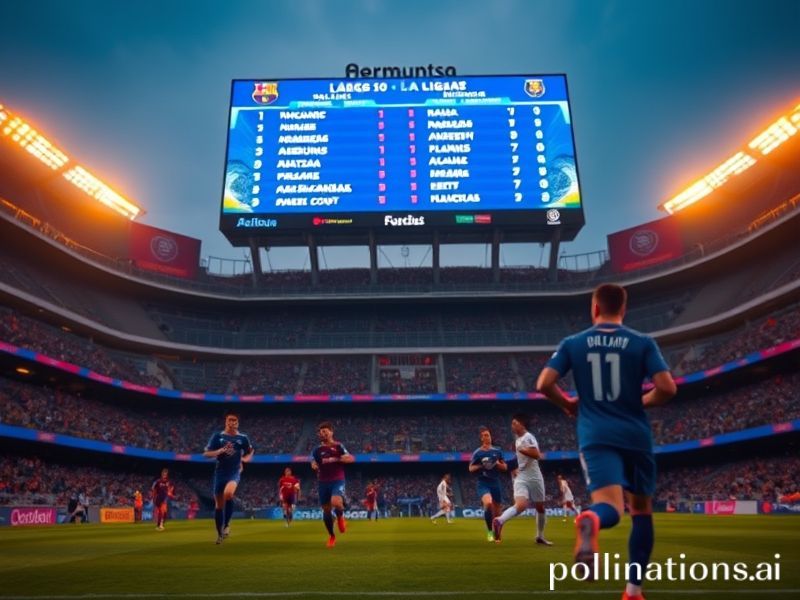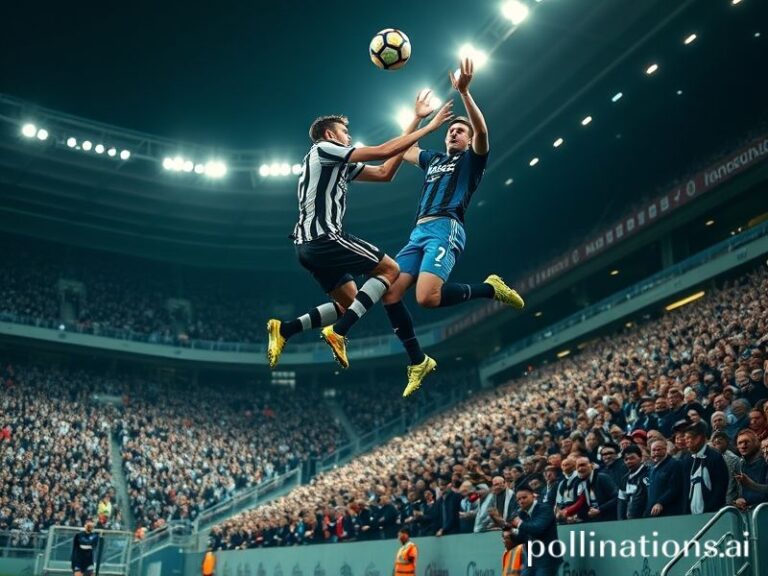Global Power Rankings: How La Liga’s Table Quietly Runs the World Economy (and Our Fragile Hopes)
Madrid, Spain – The sun still rises over the Plaza Mayor, but only after it has checked the La Liga standings on its phone. At the top, Real Madrid sit with that monarchical inevitability which makes republicans quietly despair. Ancelotti’s gentlemen lead Girona by a margin so slim it could be negotiated away over a single crooked VAR decision, yet the global betting markets treat the gap like the Strait of Gibraltar: visible, swimmable, but statistically lethal. Meanwhile Barcelona—broke, brilliant, and spiritually on OnlyFans—cling to third like a trust-fund kid who just discovered his credit card’s been cloned. The world is watching not merely for goals but for geopolitical tea leaves.
Consider the shareholders in Abu Dhabi, Riyadh, and the sovereign-wealth fund formerly known as Silicon Valley Bank. To them, these rankings are Moody’s for soft power. Every point Madrid racks up is another billion-dollar bond issue that feels vaguely tastier. Girona’s fairy-tale surge, bankrolled by the City Football Group’s spiderweb of holding companies, is less “Cinderella” than “hostile takeover in glass slippers.” And when Getafe—squad value less than a single NFT of Vinícius’s left boot—punches above its weight, economists in Beijing jot notes about wage compression and export-grade grit. Nothing says late-stage capitalism like cheering a bicycle kick while your pension fund hedges against the club’s shirt-sponsor defaulting on its carbon credits.
Across the Atlantic, Americans who still can’t spell “Athletic Bilbao” now refresh the table between mass-shooting alerts. ESPN has discovered that Spanish football is the perfect background noise for doom-scrolling: the crowd chants drown out existential dread, and the league’s Byzantine tiebreakers make the Electoral College look refreshingly simple. In Lagos, Nairobi, and Jakarta, 4 a.m. kick-offs are communal bargaining sessions with fate: if Atlético Madrid can still qualify for the Champions League after losing to a team wearing fluorescent pink, surely there’s hope for the local currency.
Speaking of Atlético, Simeone’s Rorschach-test season currently reads fifth, a position that in most democracies would trigger a snap election. Instead, the club’s PR office insists on “transition year,” a phrase that sounds suspiciously like “recalibrating strategic objectives” in a corporate layoff memo. Down in the relegation zone, Granada and Almería flirt with oblivion as if it were a Tinder date who might still pick up the cheque. Their impending drop will be mourned in Andalusia and celebrated in second-division towns where municipal budgets hinge on selling one teenage winger to Brentford.
The broader significance? La Liga’s standings are the Dow Jones of regional identity. Every weekend, Catalonia renegotiates secession via goal difference, the Basque Country measures its autonomy in clean sheets, and Castile quietly wonders why the empire never learned to defend set pieces. Meanwhile, the European Central Bank keeps an eye on broadcast-rights revenue the way medieval popes monitored indulgences: it props up too many balance sheets to fail. Should the league collapse into a super-league cartel, expect the same dignified exit we saw from Brexit—flag-waving, tear gas, and a run on season-ticket futures.
And yet, for all the spreadsheets and satellite uplinks, the table still reduces grown diplomats to playground logic. “We scored more than you” is, in the end, the only argument humanity has never outgrown. The standings will shuffle, oligarchs will refinance, and pundits will declare this the most important season since the last one. But somewhere in Vallecas, a kid who can’t afford the metro fare is chalking the current positions on a wall, adding a crude arrow next to Rayo Vallecano that points skyward. That arrow is as accurate as any Goldman Sachs forecast, and considerably cheaper. The world keeps spinning, the rich keep winning, and the table mercilessly updates—because the alternative is admitting the game was rigged from kickoff.
Final whistle approaches, but never fear; the summer transfer window is just the off-season rebranding of the same slow-motion collapse. Until then, keep refreshing. History is only ever one refresh away.







